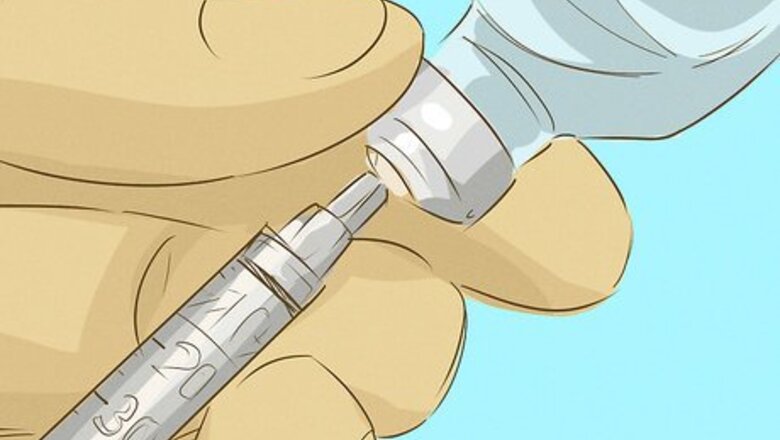
views
Using Medical Intervention to Block Myostatin
Talk to your doctor. If you are dealing with muscle loss and interested in blocking myostatin as a treatment, then talk with your doctor about your options. There are treatment options available, but some of them are still in clinical trials.
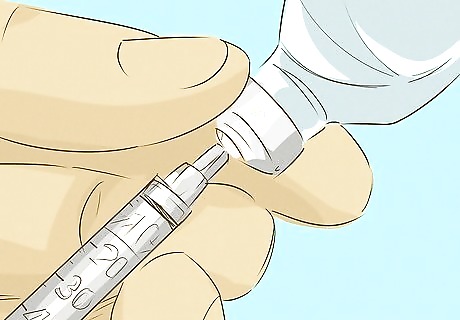
Receive gene therapy. Gene therapy is the process of transplanting certain genes into your cells to change your genetic makeup. Gene therapy is typically achieved by injection. Your doctor will provide more information about the injection and how you can prepare before receiving the follistatin-enhancing gene therapy. The procedure is still highly experimental and might not be right for you. Talk to your doctor about whether you might be able to receive myostatin-blocking gene therapy.
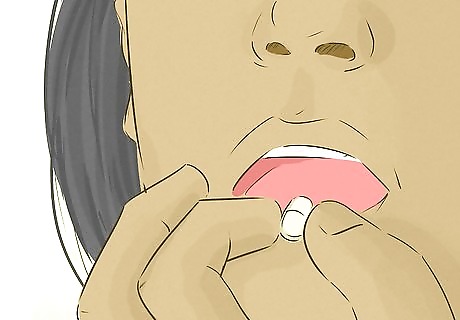
Use a myostatin inhibitor. Myostatin inhibitors are drugs that block myostatin. To obtain a myostatin inhibitor, talk to your doctor. Myostatin inhibitors are still experimental and not widely available, but your doctor might be able to enter you in an experimental myostatin blocker drug trial. In this case, you may or may not be given a myostatin-blocking drug, since the nature of experimental trials is often such that some participants get placebo drugs, while others get the authentic drug.
Exercising to Reduce Myostatin
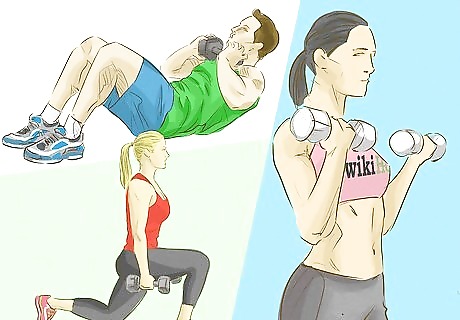
Do high-intensity resistance training (HIRT). HIRT is a type of resistance training that pushes you to your physical limits. It involves doing lots of different exercises consecutively without breaks. To perform HIRT, string several exercises together into a “super-set.” A super-set consists of multiple exercises done as fast as possible over a set amount of time. For instance, you might perform 10 bicep curls, 10 push-ups, and 10 sit-ups in a cycle for eight minutes straight, but with 1 to 1 ½ minute breaks in between sets. After completing your last set of 10 sit-ups, you would start again by doing 10 bicep curls.
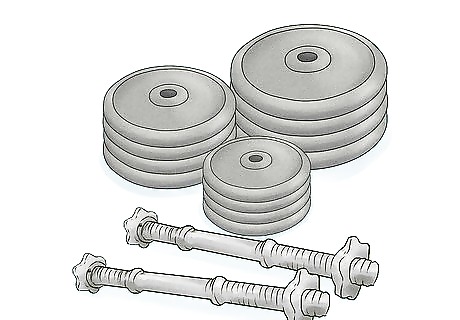
Choose an adequate weight level. When doing resistance training, it is important to lift enough weight to feel strained, but not so much that you hurt yourself or that your form is compromised. To determine the right amount of weight for you, start lifting with the least amount of weight. Perform 8-12 repetitions of the given exercise. If you do not feel winded by the end of the set, add weight in five-pound increments and try again. You’ll know that you’ve found the right amount of weight for you when you feel winded after 8-12 repetitions of the exercise in question.
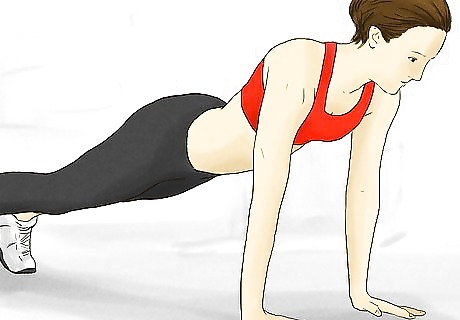
Do push-ups. Place your hands on the floor in front of you. Push your legs out behind you and balance on your toes. Position your feet in such a way that they are perpendicular to the floor. Keep your back and legs in a stiff, straight line. Lower your body so that your elbows bend at 90-degree angles and your chest barely touches the floor. Push back up off the floor to return to the starting position.
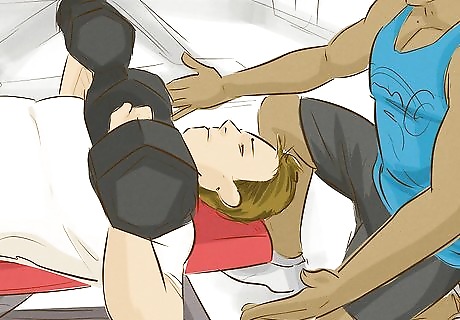
Use the bench press. Lie flat on the bench and grasp the bar with both hands. Your hands should be slightly wider than shoulder width. Lower the bar slowly to your chest. Keep your glutes and abs tight, and arch your back as you lower it. When the bar touches your chest, push it back up to the starting position.
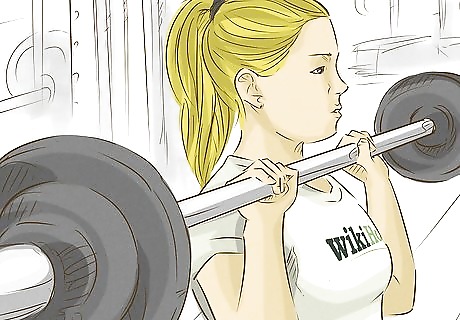
Do an overhead press. Set the barbell in a squat rack or cage. With the bar just in front of your head, place your hands on it with your palms facing forward. Lift the bar off the rack and lower it to shoulder level. Push the bar up above your head, keeping both arms at an equal height. Place your hands at a distance from one another that is slightly wider than the width of your shoulders. Each hand should be placed equidistant from its corresponding end of the bar. In other words, your left hand should be the same distance from the left end of the bar as your right hand is from the right end of the bar. After you’ve extended the bar above you as far as possible, bring it down slowly to the starting position.
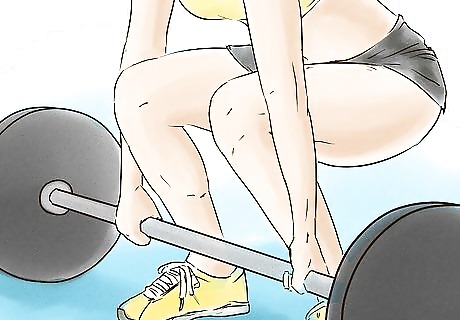
Do a deadlift. Stand with your feet hip-width apart. With the barbell in front of you on the floor, grip it with your palms facing backwards toward you. Keeping your back straight and your chest forward, push up with your legs and thrust your hips forward. Carefully lower the bar to the ground to return to the starting position. Your arms should remain straight and your hands should continue gripping the bar throughout the deadlift. Take care not to bend your back during the deadlift.
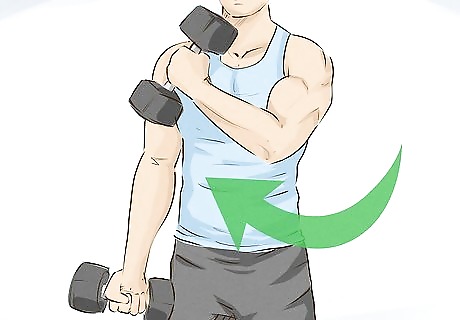
Perform a cross-body curl. Hold a dumbbell in each hand with your palms facing out. Keeping your elbows tight to your sides, pull the dumbbell toward your opposite shoulder. For instance, if you’re holding a dumbbell in your right hand, pull it up toward your left shoulder. Pause for one second when you touch the dumbbell to your shoulder, then slowly bring it back down to the starting position.
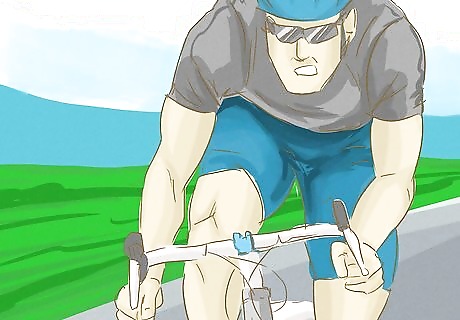
Try some aerobic exercise. There are a number of aerobic exercises that could also help you reduce your myostatin levels. For instance, you could ride a bike, go for a walk or run, or use an elliptical. While resistance exercises should be performed at high intensity, aerobic exercises should be performed at moderate intensity. Exercising at moderate intensity will give you a feeling similar to that you get when walking briskly, and should make you feel that you’re working at about 50% of your maximum physical output.














Comments
0 comment